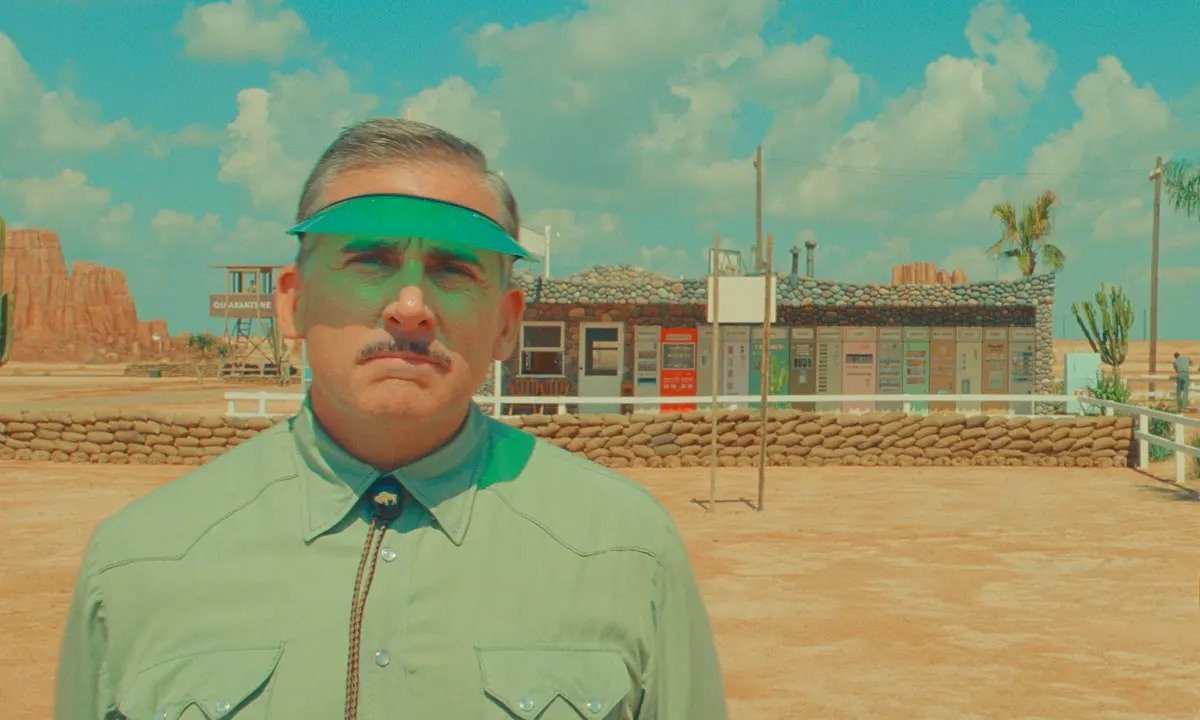'Asteroid City' Review: Wes Anderson Does It Again
Asteroid City is another triumph for writer/director Wes Anderson, solidifying his status as one of the greatest auteurs of our time.
Few filmmakers have a style as distinct as Wes Anderson’s. Each and every one of his production is a joy to watch on the big screen. Asteroid City is no exception. As his narrative continues to complexify with each production, Anderson’s visual style remains singular, and each frame begs to be seen on the biggest screen possible. While the narrative throughline of Asteroid City isn’t as strong as his previous films, it’s still held together nicely through impeccable performances from its star-studded ensemble.
Describing the plot of Asteroid City might prove too complex, as the trailer hides its most important part. However, the gist is simple: War photographer Augie Steenbeck (Jason Schwartzman) arrives in Asteroid City with his children after his car breaks down. Augie’s son, Woodrow (Jake Ryan), participates in the Junior Stargazer Competition, where he and a group of other children get to showcase their stargazing skills. However, during the competition, an Alien (Jeff Goldblum) arrives to reclaim a meteorite fragment, putting the entire city in quarantine. This allows Anderson to do what he does best: have the main character go on an introspective journey where they reflect on their place in the world.
The plot might sound simple, but it’s more complex. Like Anderson’s two previous live-action efforts, The Grand Budapest Hotel and The French Dispatch, the overall narrative is presented inside an overarching one, and that’s where the movie's best parts come from. It’s best not to spoil anything about the presentation of Asteroid City and go in as blind as a bat (preferably without seeing any of the trailers), but Anderson always dazzles with his impeccable, almost mathematically perfect production design from Adam Stockhausen, staggering cinematography from Robert Yeoman, and minimalist, but effective music from Alexandre Desplat. All of these familiar elements are there and provide a great sense of emotional depth to the film’s lavish and perfectly-constructed world.
Like with the rest of mid-stage Anderson productions, Yeoman plays with aspect ratios and film grain while shooting different scenes in black-and-white and color. It allows Asteroid City to play with a wide range of aesthetics and makes the film an eclectic, but always visually intriguing, blend of different styles of comedies and filmmaking. From a purely visual standpoint, no one does what Anderson does. Even its emulators can’t perfect the style he creates – he’s that unique. There isn’t a single frame in Asteroid City that doesn’t look amazing, and even if you don’t end up liking the story, you’re still in awe of how lavish and beautiful Anderson crafts the city, from the meteor site to the motel with all sorts of vending machines, to the diner that doesn’t get bothered that much by atom bomb tests. It’s all perfectly laid out in front of our eyes and feels amazingly lived-in.
Schwartzman has also never been better in any Anderson film. It feels huge to say this, but it’s true. His turn as Augie is miles better than his star-making turn in Anderson’s Rushmore. He plays a far more complex and layered character than the usually one-note deadpan stare he frequently gives in Anderson's pictures. And he’s joined by a roster of incredible actors all giving raw and honest performances: Scarlett Johansson, Liev Schreiber, Steve Carell, Tom Hanks, Edward Norton, Willem Dafoe, Adrien Brody, Bryan Cranston, Maya Hawke, and Margot Robbie are among the ensemble’s biggest highlights. While some are more underused than others, each cast member has at least one moment where they shine above everyone else. Robbie, in particular, steals the show with the film’s best scene. It’s a true tour-de-force from herself and Schwartzman, but that’s a scene you should discover on your own and let the narrative play out in front of you.
Speaking of the narrative, Anderson still has a complicated time tying up everything together, as he did in The French Dispatch. However, it’s far more entertaining and compact than his previous effort. It also feels more personal, as if he wants to say something about the artistic process and how a creative will always try to communicate directly with the art he creates. Norton, Brody, and Cranston say a lot about this subject, while Schwartzman’s character has a more personal outlook on the art he creates through his photographs. Anderson always seems to write himself through the main characters he creates, but never more so inside Schwartzman’s Augie. It seems as if Anderson is speaking about himself, telling the audience how he envisions his productions through multiple characters, with Augie being the most important.
Because of this, some will think he’s being self-indulgent. If you look through his filmography, he’s always been this way. The best filmmakers are always making movies for them, not for you, as petty as it sounds. Sometimes, it doesn’t work. And when you’re too self-indulgent, it feels pretentious. But when an amazingly creative mind like Anderson crafts something like Asteroid City, he takes into consideration what he likes, alongside pleasing the audience through his classic deadpan style of comedy, assembling a great cast, and making them laugh through the simplest elements in the frame. I’d love to discuss more about the thematic underpinnings of the film’s plot, but that would require spoiling some of the film’s most closely-guarded secrets. There isn’t a filmmaker with a more singular and crowd-pleasing authorial vision than Wes Anderson. He never ceases to amaze me, and I doubt I’ll ever grow tired of his consistently inventive and revolutionary style.
Grade: [A]



